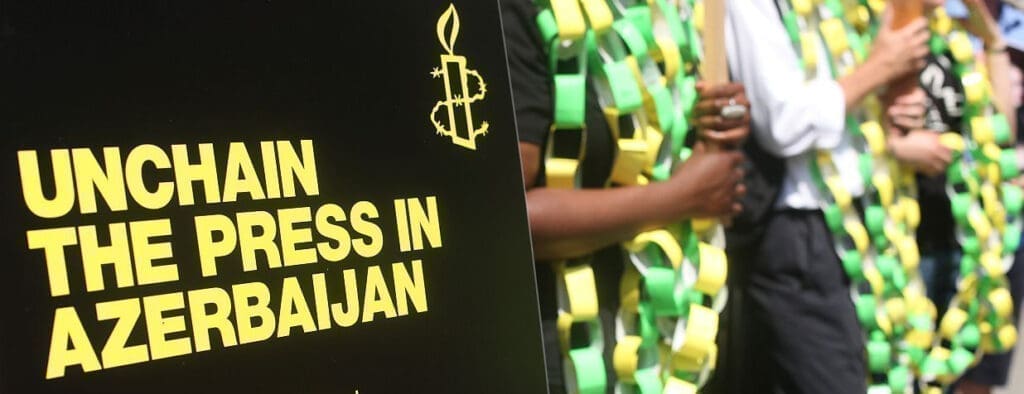“We have a small space for democracy in this country, but when a journalist is jailed for criminal defamation this space becomes smaller.”
Media activists in Azerbaijan don’t have much to cheer about these days as the country’s dismal record on press freedom shows little sign of improving. But there was some grounds for optimism recently when the Council of Europe took the Baku government to task for seemingly backpedalling on commitments to reform criminal defamation.
The Council’s Committee of Ministers strongly-worded rebuke on September 26 came just a matter of days after it received a petition from the Media Rights Institute – MLDI’s partner in Azerbaijan – which expressed deep concern that in the latest draft of a defamation reform bill, critical elements from an earlier version were missing.
The government pledged to reform the law two years ago after the European Court of Human Rights ordered the release of imprisoned Azeri journalist Eynulla Fatullayev who spent four years in jail for criminal defamation and terrorism offences relating to articles that he had written about the Nagorno-Karabakh war and Azerbaijan’s role in US policy towards Iran.
In its petition, the MRI told the Committee of Ministers that provisions for repealing heavy penalties – exorbitant fines and up to three years’ imprisonment – and limiting damages had been removed from a draft deformation reform bill that had been drawn up in cooperation with civil society organisations and the OSCE in Baku in 2012.
It also said that the government had broken a commitment made in 2011 to an unofficial moratorium on criminal defamation and that its scope had now been extended to cover cyrbercrime.
Moreover, the petition pointed out that MRI was present at a round table meeting on defamation reform in May – attended by Azeri officials, politicians, media representative and lawyers – where, it said, the chairman of the parliamentary committee for legal policy, Ali Huseynov, had said that the government had never promised to decriminalise defamation and was not going to do so.
Peter Noorlander, MLDI’s chief executive, said the petition was an important means of holding the Azeri government to account over its treatment of the press, “There is only a small group of journalists in Azerbaijan who are prepared to work independently but they are in and out of court. Ultimately what’s required in Azerbaijan is root and branch reform, but we can help to keep the independent media sector alive by challenging the government.”
Six days after MRI submitted its petition, the Committee of Ministers expressed its “grave concern that to date no progress has been achieved in preparing this draft (defamation) law” and “strongly urged” the Azeri government “to take, without any further delay, all necessary measures” to make the legislation compatible with the European Convention on Human Rights.
The statement was also critical of the extension of criminal defamation to the Internet and called on the government to take action to end the arbitrary use of legislation to punish journalists as well as ensure both the right to an impartial trial and respect of the presumption of innocence.
“I’m pleased with the Council of Ministers statement – it will put pressure on the government to take reform seriously, to consider things they didn’t want to,“ said Rashid Hajili, the chair of the MRI. “This gives us encouragement to continue monitoring the situation very closely.
“ The existence of criminal defamation makes journalists feel that their work is very risky as there’s the possibility that they will go to prison or pay heavy financial penalties for what they write. We have a small space for democracy in this country, but when a journalist is jailed for criminal defamation this space becomes smaller.
“What it means is that journalists look for safer places to work. They either give up journalism altogether or work for pro-government and state media. This gradually destroys the independent sector.”
Hajili said MLDI’s assistance in defending press freedom cases was significant. “MLDI makes an important contribution to our work: they help us materially; our lawyers gain from their expert knowledge of freedom of expression arguments; and they help us bring very strong applications before the European Court of Human Rights and other international institutions,” he said.
Recent Case Studies
Focus On: Criminal Libel in Azerbaijan
The precarious state of press freedom in Turkey, entwined with a deteriorating democratic environment, poses significant challenges to journalists. Increasingly they face arbitrary arrests, legal threats, and increasing violence in their pursuit of reporting truth. In response to these threats, the Media and Law Studies Association (MLSA), our partner, actively defends press freedom and human […]
Focus On: Criminal Libel in Azerbaijan
23 October 2023 marks one year since the killing of prominent Pakistani journalist and news anchor for Pakistani broadcaster, ARY News, Arshad Sharif. Sharif was fatally shot at close range by Kenyan Police at a roadblock near Nairobi. To this day, a transparent, independent and effective investigation into the circumstances of his death has not […]
Focus On: Criminal Libel in Azerbaijan
November 2nd marks the International Day to End Impunity for Crimes Against Journalists. The threats and dangers that constitute a stark reality for many journalists reinforce the importance of this day. Every year journalists are killed, tortured, and harassed for carrying out their work. Over 1,600 journalists have been killed since 2003 with a sharp […]



